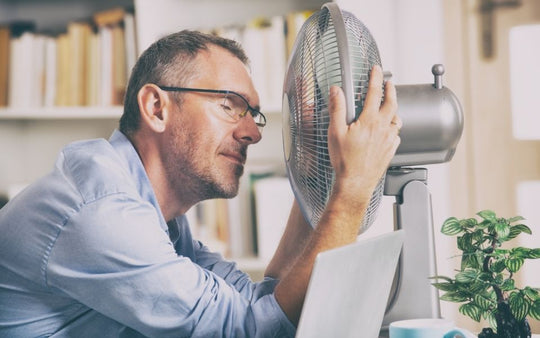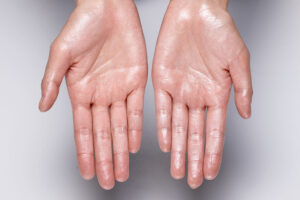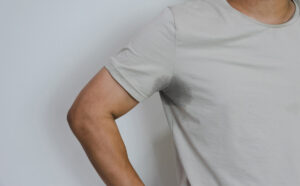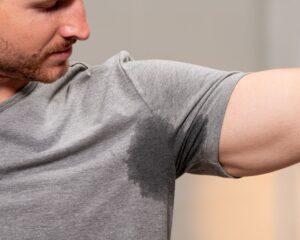Do you struggle with nervous sweating? (aka anxiety sweating)
Does internal panic ensue at the slightest sign of sweat on your brow or the palms of your hands?
Do you melt with perspiration just thinking about your next social interaction?
It may not make you feel any better, but a lot of people experience this same kind of extreme, anxious sweating.
Some sweat is good… in fact, it’s critical to your health. But marathon-like sweating during a job interview or after a simple handshake is NOT good… EVER!
You should only sweat like you’ve just run a marathon… after running a marathon. Right?!
The truth is nervous sweat is a major distraction to living the life you want. It can negatively affect your career, social life, and relationships.
We think it’s unfair. Why should some people sweat more than others? Why does a pair of sweaty armpits get to dictate how you feel about yourself and how others feel about you?
If nervous sweat is a constant thorn in your side, here’s a few tips that might help calm your nerves and curb the sweat.
7 Ways to Stop Nervous Sweating
1. Don’t Panic
Don’t panic at the first drop of sweat. The fear of sweat is often the reason we end up sweating like a cold can of soda on sweltering day. The key is to prevent your body from switching into “fight or flight” mode. This survival mechanism will ultimately lead to increased breathing, blood flow, and sweating.
It may take some jedi mind trickery, but you need to FORGET the SWEAT. Convince yourself that sweat is no big deal and that your current situation (first date, job interview, etc…) doesn’t require you to run or fight for your life. Stay calm and don’t panic.
2. Relaxation + Meditation
When you feel a bit worked up, try a relaxation techniques to help you stay calm such as focusing on your breathing. Take slow, deep breaths, hold the breath in for a few seconds, and then, release it. Repeat the process until you feel calm again. Deep breathing slows down your heart rate, which in turn, helps prevent anxious sweating. Also, consider adding meditation sessions to your normal routine to help keep any unwanted stress at bay.
3. Exercise + Weight Loss
Regular exercise can help manage sweat-inducing stress. Less stress can result in less sweating. Another benefit of exercise is potential weight loss and increased confidence. The more confidence you have, the better you can handle potentially stressful situations.
4. Know your Sweat Triggers
Certain things can trigger excess sweat. Knowing these triggers can help you avoid sweaty situations and prepare for the unavoidable ones. Common sweat triggers include job interviews, dates and speaking in public. Some not-so-obvious triggers include caffeine, alcohol, spicy foods, and processed junk food. Medications, your clothes … even your very thoughts can trigger abnormal sweating. Know your sweat triggers and avoid them if possible.
5. Stay Hydrated
Drink plenty of H2O to keep your body temperature cool. This will reduce the amount of heat your body has to release in the form of sweat on your skin.
6. Be Prepared, Arm Yourself with a Strong Antiperspirant
Life happens. You can’t avoid every potentially stressful situation and you can’t live the rest of your days out in a cave. One way to combat nervous sweating is by using a clinical strength antiperspirant like SweatBlock. Unlike deodorants that simply mask odor, antiperspirants have the ability to block sweat. Arm yourself with a strong antiperspirant to reduce sweat and boost confidence.
Tip: Nervous sweat has a tendency to be stinky sweat. If you want to put a stop to the stink and the sweat, try a combination antiperspirant deodorant.
7. Dress Strategically
The strategy here is to dress in a way that doesn’t produce more sweat and doesn’t promote nervous sweat. Wear light, breathable fabrics that keep you cool. Wear patterns, darks, blacks or light jackets to hide sweat. Don’t promote your sweaty armpits by wearing solid colors, grays, and light blues. For sweaty hands and face, keep a handkerchief handy. You can quickly wipe away sweat before it compounds into extreme sweat.
Why We Sweat When We’re Nervous
Any type of excessive sweating can be embarrassing, but nervous sweating is probably the worst. Just think about it for a minute.
Have you ever…
- Dealt with clammy hands on a first date?
- Had beads of sweat appear all over your forehead before giving an important presentation at work?
- Felt really anxious about something, and then, noticed that your feet are suddenly sliding around in puddles of sweat?
It’s not fun. But you don’t have to stop living your life to the fullest because of it either. Instead, learn more about why you’re prone to nervous sweating and how to deal with it once and for all.
Can Being Nervous Cause Sweating?
When you’re nervous it activates your stress hormones. And when activated, those hormones cause your body temperature and heart rate to increase slightly. This sends a message to your sweat glands telling them it’s time to produce sweat to cool your body off a bit.
Unfortunately, this isn’t a process that you can control. The best thing you can do to avoid nervous sweating completely is to practice different stress and anxiety-relieving techniques, such as deep breathing, to keep yourself as calm as possible. If you do this every time you start to feel nervous, stressed, or anxious, there’s a good chance you can prevent nervous sweating altogether. But if it doesn’t work, there are plenty of other things you can try too.
What Causes Nervous Sweating?
When it comes to being nervous, anxious, or stressed, everyone has their own triggers. You might become really nervous before an important meeting or before you have to give a big speech, while others may be really nervous when they meet someone for the first time or any time they go on a date. Of course, if you’re in a situation that makes you nervous, the last thing you want to do is start sweating profusely.
Unfortunately, all of these feelings send red flags to your body telling it that you’re on the brink of overheating. So your body starts producing extra sweat in an effort to stay cool. It’s a completely natural process that’s totally annoying and embarrassing.
When you know you’ll be faced with a circumstance that’s a trigger for you, do everything you can to remain calm. The calmer you stay, the less likely you are to start sweating. We know this can be hard to do. To help, wipe your problem areas down with a SweatBlock towelette in advance if possible. This will reduce the amount of sweat your body produces, giving you one less thing to be stressed about.
Which Nervous System Controls Sweating?
The sympathetic nervous system controls sweating. It’s part of the autonomic nervous system, which controls your body functions that you don’t consciously direct such as your heartbeat and breathing.
The sympathetic nervous system is the portion of the autonomic nervous system that triggers your body’s fight-or-flight response. So any time you’re nervous, scared, anxious, or stressed, it tells your sweat glands to start working so that you don’t overheat internally. Basically, this system works to protect you from the inside out.
How to Treat Nervous Sweating
There are several ways to treat nervous sweating, but there isn’t one treatment or remedy that works for everyone. So it’s important to try different types of treatments until you find one that works for your body. For most people, it’s a combination of home remedies or antiperspirants and prevention techniques.
How to Calm Nervous Sweating
The key to calming nervous sweating is calming yourself. You can’t control the amount of sweat your body produces, but you can control the way you feel — to an extent. There are two ways you should approach this problem.
First, you should try to work on the reason you’re nervous in certain situations. For example, if you get so nervous during dates that you get really sweaty hands, you might want to try working on your confidence. Consider making it a point to talk to strangers casually as much as possible. Eventually, you’ll start feeling comfortable and confident holding conversations with people you don’t know well. The added confidence you gain can help stay calm on your next date. The same technique can be used if you’re nervous about speaking in front of an audience. Practice your speeches at home, in front of friends and family members, and work your way up to speaking in front of larger crowds.
In addition to working on the main causes of your nervousness, you should practice calming techniques. These can help calm you down any time you find yourself in a situation that makes you feel nervous.
Take slow, deep breaths until you feel yourself calm down.
Remove yourself from the situation for a few minutes to give yourself time to calm down.
Practice mindfulness meditation to focus on the present. This allows you to focus on the moment realistically, instead of focusing on your fears or expectations surrounding the moment. To do this, focus on specific sights or sounds nearby. This brings you back into the present moment and gets you out of your head.
How to Stop Nervous Sweating Naturally
To stop nervous sweating naturally, the best thing to do is work on your mindset. You get nervous because you have specific thoughts, expectations, or fears surrounding certain tasks or events. For example, if you constantly think that other people are judging you or have a bad perception of you, it may make you nervous to speak in front of groups or meet new people. It’s thoughts like these that are rooted in your anxiety. If you make a conscious effort to flip the negative thoughts into positive ones, you’ll start to feel more confident and are less likely to become nervous.
Additionally, you can try different home remedies designed to keep you calm such as:
Eat more fish. Omega-3 fatty acids work to protect against depression and anxiety.
Eat a protein-filled breakfast every day. Low levels of choline are associated with increased anxiety, and eating protein at breakfast helps regulate your levels throughout the day.
Grab a snack. Anxiety and nervousness often set in when your blood sugar levels are a bit low, so grab a quick snack.
Exercise regularly. When you exercise on a regular basis it helps eliminate lingering depression and anxiety. It makes you feel healthier, which automatically boosts your self-esteem.
Preventing Nervous Sweating on the Face
When your nervous sweat appears on your head, face, or neck, it’s hard to hide — which of course, makes it even more embarrassing. Fortunately, there are a few things you can do to help prevent nervous sweating on your face.
Our top recommendation for head, face, and neck sweating is using SweatBlock — and no we aren’t just tooting our own horn. It actually does work. Before you go to bed at night, wipe down your face and neck with a SweatBlock towelette. Then, go to sleep and let SweatBlock work its magic. When you’re sleeping, your sweat glands aren’t as active. So the clinical-strength antiperspirant on the towelette can easily get into your pores. While one nighttime treatment is enough to reduce the amount of sweat you produce for between four and seven days, you can also carry a SweatBlock towelette with you — just in case.
Speaking of towelettes, you can also carry alcohol wipes with you to use in the event of an emergency. If a situation arises that makes you nervous, quickly wiping down your face with an alcohol wipe will close your pores so excessive amounts of sweat can’t escape. If you wear makeup, consider wiping your face down with an alcohol wipe before applying your makeup to close your pores. Keep in mind though, alcohol is very drying. You might want to also use a lightweight moisturizer to keep your skin hydrated properly.
You should also drink plenty of water throughout the day to stay hydrated. When your body is properly hydrated, your body temperature doesn’t rise as easily. And because you produce sweat when your body temperature starts to rise, it’s important to keep your internal temperature as cool as possible to prevent sweating. Also, avoid eating food that’s spicy, hot, or filled with sodium. They automatically make your body temperature rise a bit.
If you can’t find a natural remedy for nervous sweating on your head, neck, or face, you might consider getting botox treatments. When used to treat excessive sweating, botox treatments are done a bit differently than they are when they are used to get rid of wrinkles and age lines. The botox gets injected at specific points, numbing the nerves in the area completely. This way, when your brain tries to signal the nerves to produce sweat, it doesn’t work.
Dealing with Sweaty Hands
1. Carry Alcohol Wipes
Wipe your hands with alcohol wipes to dry out your hands before important social interactions. It’s a very temporary fix, but it may just help you avoid some akward handshakes and handholding. Alcohol based hand sanitizers can also work.2. Try Hand Antiperspirant
Want a more effective treatment for sweaty hands? Try a topical antiperspirant cream or lotion. We recommend our specialized SweatBlock hand antiperspirant.3. Use Body Powder to Absorb Hand Sweat
If you feel like your hands are starting to get clammy, rub a bit of body powder between them to absorb any excess moisture. Consider carrying a travel-size bottle with you or keeping one in your desk at work to use as needed.4. Soak your hands in vinegar
Soak your hands in a mixture of warm water and white vinegar two to three times per week for about 20 minutes. The warm water opens your pores, allowing the white vinegar to work its way into them. When you remove your hands from the mixture, run them under cold water for about 20 seconds to close your pores back up. The white vinegar helps reduce the amount of sweat your palms produce and closing up the pores when you’re done, prevent sweat from seeping out of them. This is also a good option for anyone with excessively sweaty feet.How to Combat Nervous Sweating in Public
If you’re worried about nervous sweating in public situations, it’s important to do whatever you can to reduce the amount of sweat your body produces before you leave your home. The more prepared you are, the easier it is to avoid profuse sweating in public, and if it does happen, you won’t need to worry because you’ve already prepared yourself to hide it.
Wear an undershirt beneath your clothing to trap excess sweat before it can stain your outer layer of clothing. This helps prevent embarrassing pit stains or sweat stains on other parts of your clothes.
Wear sweat guards underneath your clothes. Sweat guards are made to sit in the armpit area of your shirt. They absorb excess sweat so that it doesn’t stain your clothing and isn’t noticeable to people around you.
Use clinical-strength antiperspirant. You can purchase a deodorant that includes a clinical-strength antiperspirant to use on your underarm area. Or you can purchase antiperspirant wipes, such as SweatBlock, to use on other areas of your body.
Do your best to stay out of the heat and sun. The cooler you are, the less sweat your body produces. So you don’t want to do anything that causes you to sweat more.
Discuss Nervous Sweating With Your Doctor
It’s common for people battling nervous sweating to avoid talking to others about it because they are embarrassed or feel alone. But the condition is actually really common, and your doctor may be able to help you with the problem.
In most cases, doctors and dermatologists suggest that their patients try different remedies before they prescribe medication. But if you’ve already exhausted every home remedy you know and clinical-strength antiperspirant isn’t working, it might be time for a prescription.
Because your excessive sweating is caused by your nervousness, your doctor may suggest an anti-depressant or anti-anxiety medication to help regulate your moods.
There are also oral prescription medications that reduce the amount of sweat you produce, but your doctor may feel that a topical prescription medication is the better option for you.
Topical prescription meds come in cream form and can be applied as needed. So before you go into a situation that you know will make you nervous, simply apply the cream to the areas of your body that sweat the most. The cream works in the same way as an alcohol wipe or SweatBlock towelettes. It closes the pores and dries up the area to keep it sweat free. The only difference is that instead of being clinical strength, the medication is prescription strength, which is why it’s typically used only when other options aren’t working.
Ultimately, the key to combating nervous sweating is to do whatever you can to remain as calm as possible. If that’s not possible, you should try a combination of natural treatments to combat your excessive sweating. And if all else fails, consult your doctor. He or she may be able to prescribe medication that helps prevent you from sweating so much.
You might also like...
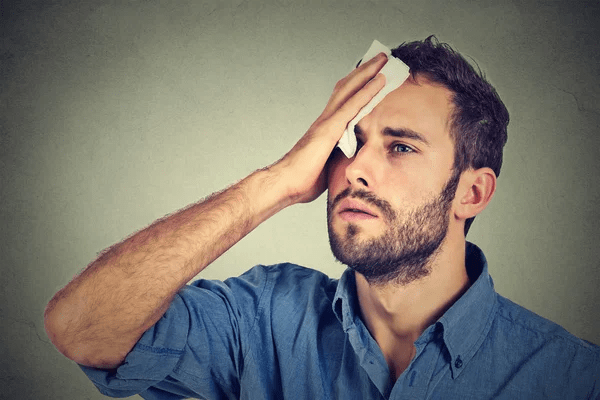
Why Does My Face Sweat So Much?: Tips And Treatments For Face Sweating
Table of Contents Do you ever feel like you’re the sweatiest person in the room? Is face sweating getting in
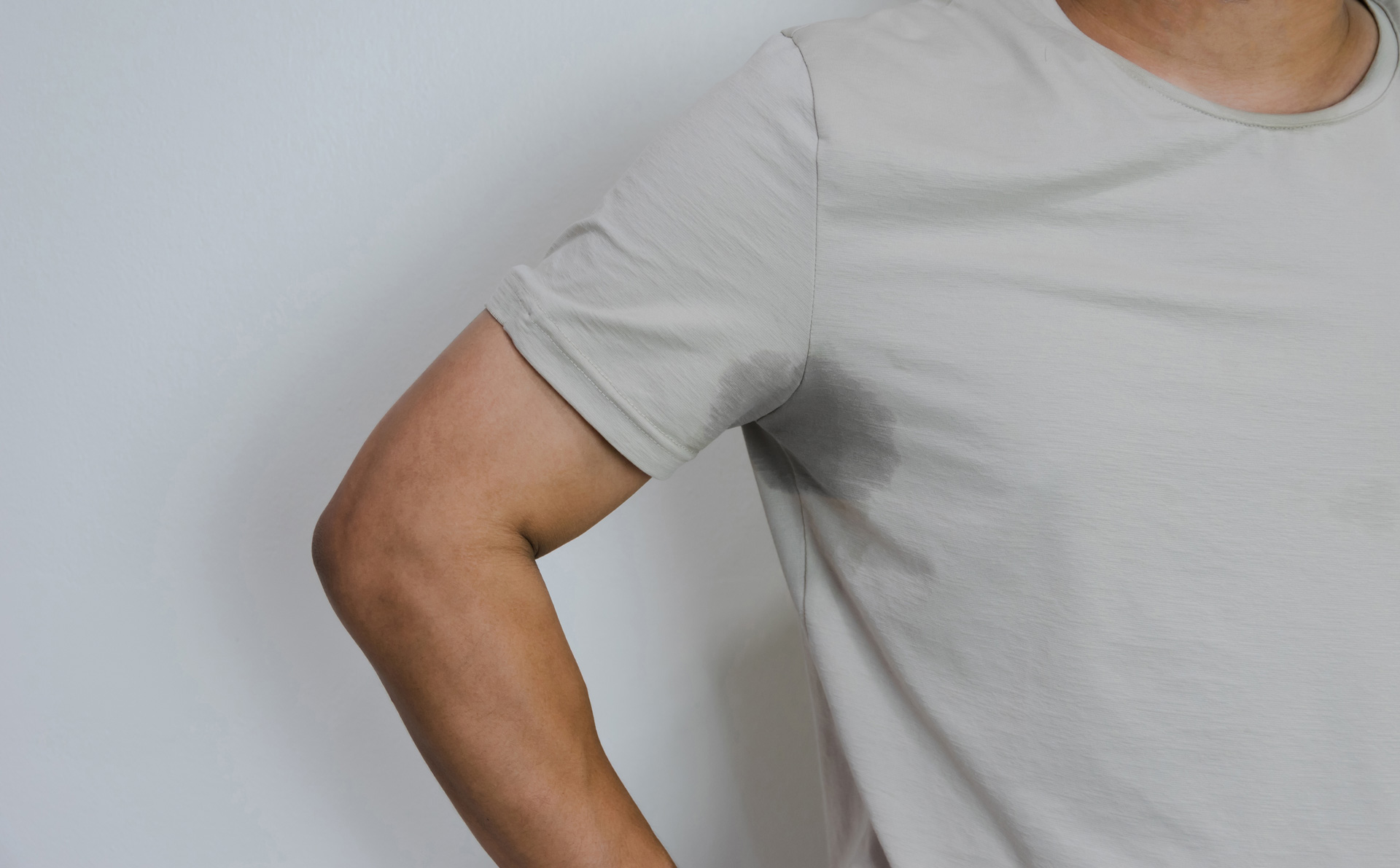
How to Stop Armpit Sweat – 12 Ways to Keep Underarms Dry
Have you ever hesitated to hug someone, raise your hand, or cheer on your favorite team solely because you didn’t
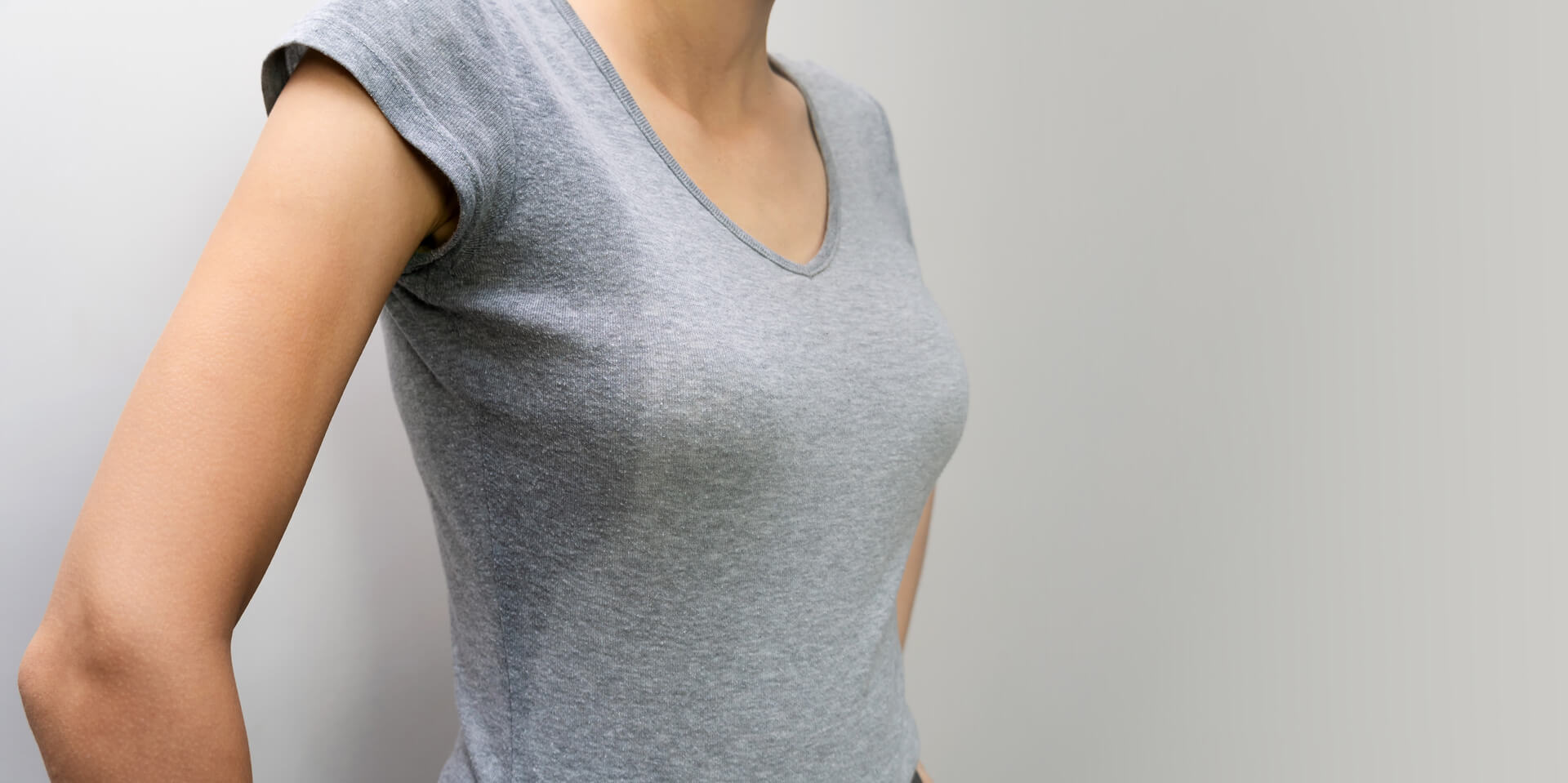
How to Stop Sweating Naturally – Huge List Tips & Home Remedies
Table of Contents For most people, sweating is a totally natural bodily function. For others, it’s a nonstop nightmare. Excessive




